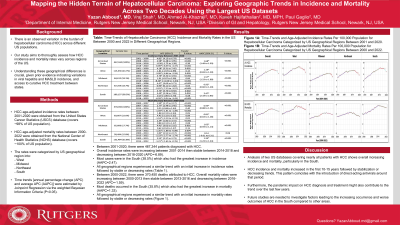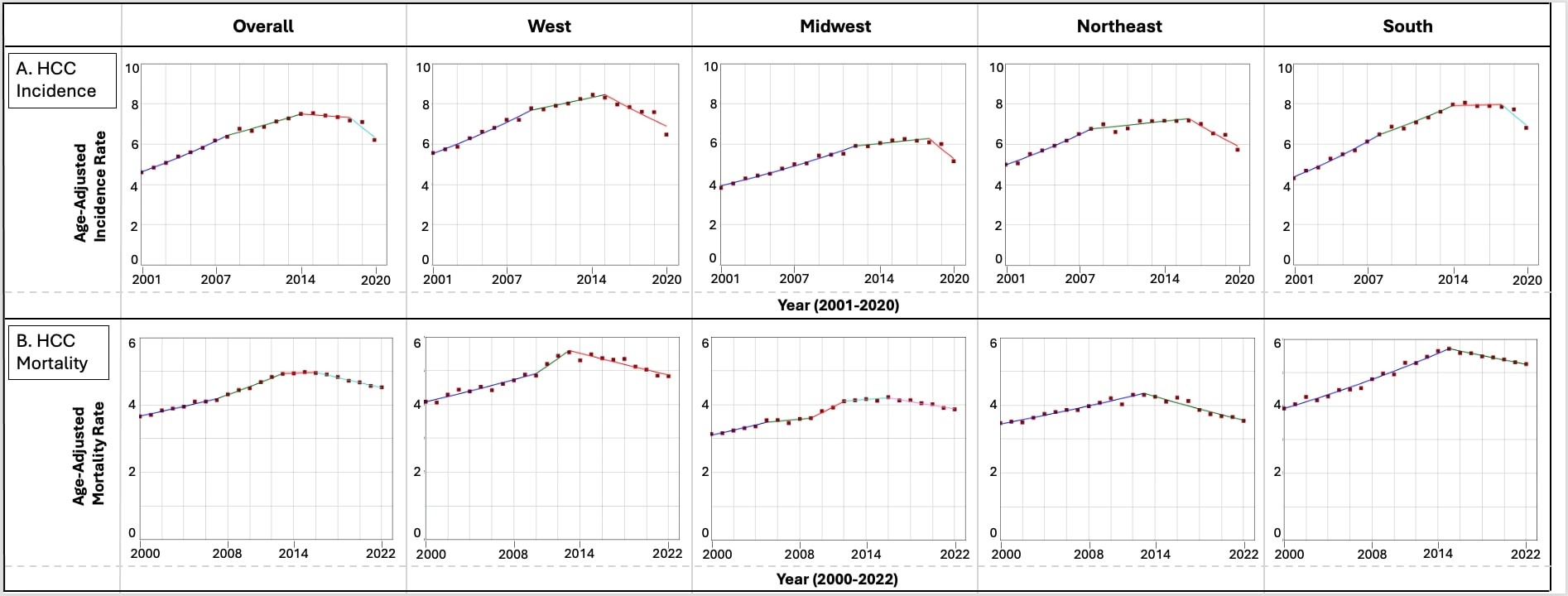Tuesday Poster Session
Category: Liver
P4685 - Mapping the Hidden Terrain of Hepatocellular Carcinoma: Exploring Geographic Trends in Incidence and Mortality Across Two Decades Using the Largest United States Datasets
Tuesday, October 29, 2024
10:30 AM - 4:00 PM ET
Location: Exhibit Hall E

Has Audio
.jpg)
Yazan Abboud, MD
Rutgers New Jersey Medical School
Newark, NJ
Presenting Author(s)
Yazan Abboud, MD1, Vraj P. Shah, MD1, Ahmed Al-Khazraji, MD1, Kaveh Hajifathalian, MD1, Paul Gaglio, MD2
1Rutgers New Jersey Medical School, Newark, NJ; 2Rutgers NJ Medical School, Newark, NJ
Introduction: There is an observed variation in the burden of hepatocellular carcinoma (HCC) across different US populations. Our study aims to thoroughly assess how HCC incidence and mortality rates vary across regions of the US. Understanding these geographical differences is crucial, given prior evidence indicating variations in viral hepatitis and MASLD incidence, and access to curative HCC treatment between states.
Methods: HCC age-adjusted incidence rates between 2001-2020 were obtained from the United States Cancer Statistics (USCS) database (covers ~98% of US population). HCC age-adjusted mortality rates were obtained from the National Center of Health Statistics (NCHS) database (covers ~100% of US population). The rates were categorized by US geographical region into West, Midwest, Northeast, and South. Time-trends [annual percentage change (APC) and average APC (AAPC)] were estimated by Joinpoint Regression via the weighted Bayesian Information Criteria (P< 0.05).
Results: Between 2001-2020, there were 467,344 patients diagnosed with HCC. Overall incidence rates were increasing between 2001-2014 then stable between 2014-2018 and decreasing between 2018-2020 (APC=-6.89). Most cases were in the South (38.5%) which also had the greatest increase in incidence (AAPC=2.47). All geographical regions experienced a similar trend with an initial increase in incidence rates followed by stable or decreasing rates (Table 1).
Between 2000-2022, there were 370,450 deaths attributed to HCC. Overall mortality rates were increasing between 2000-2013 then stable between 2013-2016 and decreasing between 2016-2022 (APC=-1.59). Most deaths occurred in the South (35.8%) which also had the greatest increase in mortality (AAPC=1.33). All geographical regions experienced a similar trend with an initial increase in mortality rates followed by stable or decreasing rates (Figure 1).
Discussion: Analysis of two US databases covering nearly all patients with HCC shows overall increasing incidence and mortality, particularly in the South. HCC incidence and mortality increased in the first 10-15 years followed by stabilization or decreasing trends. This pattern coincides with the introduction of direct-acting antivirals around that period. Furthermore, the pandemic impact on HCC diagnosis and treatment might also contribute to the trend over the last few years. Future studies are needed to investigate factors leading to the increasing occurrence and worse outcomes of HCC in the South compared to other areas.

Note: The table for this abstract can be viewed in the ePoster Gallery section of the ACG 2024 ePoster Site or in The American Journal of Gastroenterology's abstract supplement issue, both of which will be available starting October 27, 2024.
Disclosures:
Yazan Abboud, MD1, Vraj P. Shah, MD1, Ahmed Al-Khazraji, MD1, Kaveh Hajifathalian, MD1, Paul Gaglio, MD2. P4685 - Mapping the Hidden Terrain of Hepatocellular Carcinoma: Exploring Geographic Trends in Incidence and Mortality Across Two Decades Using the Largest United States Datasets, ACG 2024 Annual Scientific Meeting Abstracts. Philadelphia, PA: American College of Gastroenterology.
1Rutgers New Jersey Medical School, Newark, NJ; 2Rutgers NJ Medical School, Newark, NJ
Introduction: There is an observed variation in the burden of hepatocellular carcinoma (HCC) across different US populations. Our study aims to thoroughly assess how HCC incidence and mortality rates vary across regions of the US. Understanding these geographical differences is crucial, given prior evidence indicating variations in viral hepatitis and MASLD incidence, and access to curative HCC treatment between states.
Methods: HCC age-adjusted incidence rates between 2001-2020 were obtained from the United States Cancer Statistics (USCS) database (covers ~98% of US population). HCC age-adjusted mortality rates were obtained from the National Center of Health Statistics (NCHS) database (covers ~100% of US population). The rates were categorized by US geographical region into West, Midwest, Northeast, and South. Time-trends [annual percentage change (APC) and average APC (AAPC)] were estimated by Joinpoint Regression via the weighted Bayesian Information Criteria (P< 0.05).
Results: Between 2001-2020, there were 467,344 patients diagnosed with HCC. Overall incidence rates were increasing between 2001-2014 then stable between 2014-2018 and decreasing between 2018-2020 (APC=-6.89). Most cases were in the South (38.5%) which also had the greatest increase in incidence (AAPC=2.47). All geographical regions experienced a similar trend with an initial increase in incidence rates followed by stable or decreasing rates (Table 1).
Between 2000-2022, there were 370,450 deaths attributed to HCC. Overall mortality rates were increasing between 2000-2013 then stable between 2013-2016 and decreasing between 2016-2022 (APC=-1.59). Most deaths occurred in the South (35.8%) which also had the greatest increase in mortality (AAPC=1.33). All geographical regions experienced a similar trend with an initial increase in mortality rates followed by stable or decreasing rates (Figure 1).
Discussion: Analysis of two US databases covering nearly all patients with HCC shows overall increasing incidence and mortality, particularly in the South. HCC incidence and mortality increased in the first 10-15 years followed by stabilization or decreasing trends. This pattern coincides with the introduction of direct-acting antivirals around that period. Furthermore, the pandemic impact on HCC diagnosis and treatment might also contribute to the trend over the last few years. Future studies are needed to investigate factors leading to the increasing occurrence and worse outcomes of HCC in the South compared to other areas.

Figure: Figure 1A: Time-Trends and Age-Adjusted Incidence Rates Per 100,000 Population for Hepatocellular Carcinoma (HCC) Categorized by US Geographical Regions Between 2001 and 2020.
Figure 1B: Time-Trends and Age-Adjusted Mortality Rates Per 100,000 Population for Hepatocellular Carcinoma (HCC) Categorized by US Geographical Regions Between 2000 and 2022.
Figure 1B: Time-Trends and Age-Adjusted Mortality Rates Per 100,000 Population for Hepatocellular Carcinoma (HCC) Categorized by US Geographical Regions Between 2000 and 2022.
Note: The table for this abstract can be viewed in the ePoster Gallery section of the ACG 2024 ePoster Site or in The American Journal of Gastroenterology's abstract supplement issue, both of which will be available starting October 27, 2024.
Disclosures:
Yazan Abboud indicated no relevant financial relationships.
Vraj Shah indicated no relevant financial relationships.
Ahmed Al-Khazraji indicated no relevant financial relationships.
Kaveh Hajifathalian indicated no relevant financial relationships.
Paul Gaglio indicated no relevant financial relationships.
Yazan Abboud, MD1, Vraj P. Shah, MD1, Ahmed Al-Khazraji, MD1, Kaveh Hajifathalian, MD1, Paul Gaglio, MD2. P4685 - Mapping the Hidden Terrain of Hepatocellular Carcinoma: Exploring Geographic Trends in Incidence and Mortality Across Two Decades Using the Largest United States Datasets, ACG 2024 Annual Scientific Meeting Abstracts. Philadelphia, PA: American College of Gastroenterology.
